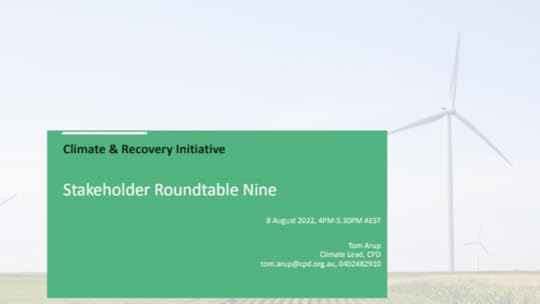Centre for Policy Development's Blog, page 11
September 27, 2022
Raising the Bar – Centre for Policy Development – Sustainable Economy Program
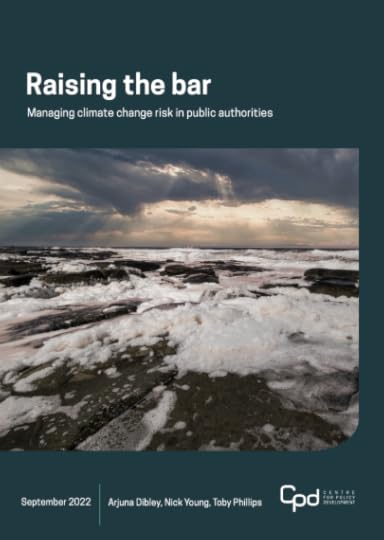
Raising the Bar: Managing Climate Change Risk in Public Authorities is a report from the Centre for Policy Development’s Sustainable Economy Program.
It recommends that clear, transparent policy direction be provided to public authority directors. This can enable them to contribute to a whole-of-government picture of climate risk that meets and raises the standards that apply to all organisations, public and private, in discovering, disclosing and addressing climate risk.
Raising the Bar examines the legal and practical aspects of how directors’ duties in public authorities and government-owned corporations (GOCs) apply in relation to climate risk, and makes six recommendations for best practice.
Give clear and transparent policy direction through ministerial statementsStandardise the technical frameworks for risk assessment, particularly around financial risk disclosure, for example by adapting the private sector framework from the Task Force on Climate-related Financial DisclosureCreate a whole-of-government picture of climate risk exposureLeverage audit offices’ authority to consider climate change risks among government agencies and/or public authoritiesInvest in building capability and capacityInfluence private sector take-up of climate change risk reportingThe report authors are CPD Fellow Dr Arjuna Dibley, Nick Young and Sustainable Economy Program Director Toby Phillips.
 Read 'Raising the Bar'
Read 'Raising the Bar'
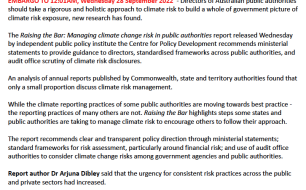 Media Release
Media Release
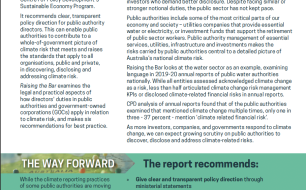 'Raising the Bar' at a glance
'Raising the Bar' at a glanceThe post Raising the Bar – Centre for Policy Development – Sustainable Economy Program appeared first on Centre for Policy Development.
September 20, 2022
Listen: Senate Select Committee on Work and Care – Evidence for A Guarantee for Young Children and Families
On Tuesday 20 September CPD gave evidence to the Melbourne hearing of the Senate Select Committee on Work and Care.
This followed a written submission published on September 14, advocating for holistic reform of Australia’s early childhood system to establish a guarantee for young children and families, as recommended by the Starting Better report.
The testimony included evidence for 52 weeks paid parental leave shared between partners to bring Australia up to the average OECD parental leave standard, and a universal early childhood system to make Australia the best place to be a child, and to raise one.
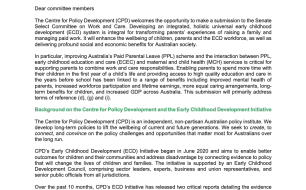 Read CPD's submission
Read CPD's submission
 Read 'Starting Better'Transcript of Proceedings Select Committee on Work and Care – 20/09/2022
Read 'Starting Better'Transcript of Proceedings Select Committee on Work and Care – 20/09/2022BROWN, Ms Annabel, Deputy Chief Executive Officer, Centre for Policy Development
HAYES, Ms Jacki, Program Director, Early Childhood Development Initiative, Centre for Policy Development
CHAIR: I now welcome representatives of the Centre for Policy Development. I understand that information on parliamentary privilege and the protection of witnesses and evidence has been provided to you. Thank you so much for being here. Would you like to make a short opening statement before members of the committee ask you some questions?
Ms Brown : I would, thank you. First of all, I thank you, Chair and committee members. The Centre for Policy Development is grateful for the opportunity to participate in your public hearings. I’d also like to start by acknowledging that we’re meeting on Wurundjeri land and paying my respects to elders past and present. I extend that respect to any First Nations people here with us today.
CPD is a non-partisan independent policy institute. We create, connect and convince on long-term policy challenges and opportunities facing Australia and the region. Supporting effective government and service delivery systems has been a core part of CPD’s work since our founding in 2007. Our work on early childhood development grew from that work starting in 2020.
As our submission outlines, most of CPD’s work in relation to the inquiry’s terms of reference concerns the impact on young children and families of combining work and care and the need for holistic reform to transform Australians’ experience of raising a family and managing paid work at the same time. Our work on early childhood development has included two reports on the evidence for a universal early childhood system and how it could be implemented in Australia. CPD has also established a council on early childhood development. To support this work, the council brings together senior leaders from the early childhood sector, business, academia, unions and all Australian jurisdictions. We work in close collaboration with many of the actors in the sector. We note that a number of members of our council and other partners have also provided submissions to this inquiry, including, of course, SNAICC, Early Childhood Australia, the Parenthood, the Front Project and many others.
Our work has highlighted the inadequacy of current support systems for parents to combine work and care responsibilities and for young children and families to thrive. The early childhood development system should be considered an essential element of Australia’s social and economic infrastructure, but it has not traditionally been treated as such. While we have strong foundations to build on, there is a wide variation in service systems, and there are different starting points for reform across jurisdictions and critical gaps in quality, access, service provision and workforce supply. Insufficient attention is paid to how all the parts fit together, which means we are missing opportunities to support the wellbeing of all young children and parents at a really critical time of life.
Our report Starting Better proposes a national guarantee for young children and families. This is a universal entitlement that would be a new pillar of Australia’s social deal, much like Medicare and the school system. The guarantee would entitle every child and their family to more paid parental leave, three days of free or low-cost, high-quality early childhood education and care per week from birth until school, a stronger maternal and child health system, smoother transitions to school and more integrated services. The guarantee would transform families’ experiences of combining work and care in the early years of a child’s life. As outlined in our submission, we recommend adopting the guarantee for young children and families in full. We would, however, like to draw the committee’s attention to three key components of the guarantee that are particularly relevant to supporting combined work and care.
Firstly, we recommend extending paid parental leave to up to 12 months per family, with incentive for leave to be shared between partners. Australia’s current scheme makes it difficult for individuals to meaningfully engage in work while raising young children, creating negative impacts over the short and long term. It contributes to many mothers leaving the workforce for extended periods. The workforce participation rate of mothers with children aged from birth to five is 28 per cent below fathers, and the lower participation rate persists after their children start school. Paid parental leave of up to one year increases the likelihood of mothers returning to their job because they maintain a connection to their employer. Shared leave has also been found to improve child wellbeing, reduce parenting stress and foster lasting equality in the household division of care responsibilities. A Swedish study found that, for each month a father stays on parental leave, maternal earnings increased by 6.7 per cent. Shared leave would mean that more women stay in work while raising a family, improving earnings, female workforce participation and gender equality.
The second element we want to emphasise is the role of universal early childhood education and care in fostering the wellbeing and development of young children and supporting parents to manage work and care. A universal approach will clarify, simplify and amplify public expectations for children’s early years. Universal services provide a lower barrier to entry and a soft entry point to more targeted services. They are the best way to benefit children and families who need them most. Making early childhood education and care universal is also the best way to improve gender equity and labour force participation. Our latest report, Starting Now, recommends priorities to move towards universal early childhood education and care as a backbone of a well-connected early childhood development system. This includes action to improve the affordability and accessibility of high-quality early childhood services and making sure that we have the early childhood professionals to deliver them.
Finally, we want to stress that reforms to the early childhood development system need to be approached holistically. As our submission outlines, each element is integrated and expands the impact of other parts of the system. For example, providing families with one year of paid parental leave would reduce demand for places in early childhood education and care for our very youngest children.
Holistic reform will have major benefits for Australia’s economy and society. In Starting better, we estimate that, when fully implemented, the guarantee would deliver tax and savings benefits of approximately $5 billion per annum, and this would increase over time as the full benefits flow through. We also estimate a GDP increase of up to $10 billion per annum.
The levers to address these challenges don’t, however, sit with one portfolio, and they don’t rest with one level of government. The Commonwealth and the states and territories should have joint responsibility to steward and deliver a universal child focused system. If we’re going to get the most out of our investment in the early years and genuinely improve our work and care systems, we need a new approach involving collective ownership, effort and accountability.
Thank you very much. We’re really happy to answer any questions that you have.
CHAIR: Maybe I’ll go first this time. I’m just curious. Sitting here today, we’ve heard a lot of very rich evidence from a range of people, and I’d say there’s a lot of agreement across what we’re hearing on the gaps and challenges in our early childhood education and care system, in particular, but also on paid parental leave. You’re researchers. I’m just wondering: what’s your view about how we’ve landed where we are as a country, with this many gaps and challenges for our most vulnerable—our children and our carers?
Ms Brown : It’s a big question.
CHAIR: It’s a big question, but I just invite you to respond. I’m curious. We’re a country that led the world on many industrial conditions—on controlling hours of work, for example—yet we have a very frayed work and care system.
Ms Brown : Yes.
Ms Hayes : I would probably respond with two things that come immediately to mind. One is the Commonwealth-state split. It doesn’t engender integration and cooperation. Once upon a time, there was a childcare responsibility that rested with the Commonwealth and there was an early learning responsibility that rested with the states and territories. In some ways that might have worked for a period of time, but, as those systems have become more integrated in the services and in the way families experience them, it hasn’t been matched in the Commonwealth-state relationships. That’s why Annabel has said we really think that you need to look at the Commonwealth and state responsibility and investment together—capital investment and recurrent investment. The whole thing has to be done in a much more integrated way.
The other thing I would say is that child care was seen as a measure for workforce participation, whereas now, with understandings of brain development for children aged from nought to five, we absolutely understand the importance of those early years. So you have a policy objective that’s very much about child development and workforce participation, but we don’t have the systems that equally privilege both of those things. You heard a moment ago from SNAICC that with the activity test—whether or not you agree that it’s actually delivering that—it’s about workforce participation. It’s really privileging that in the funding model. If you were holding both of those things equal, you would fund it in a different way so that you would get both of those outcomes. I think that, because it’s traditionally and historically been about workforce participation, it hasn’t really caught up with what we now understand about the importance of child development in those early years. I think those two things are the—
CHAIR: So you’re pointing to systems of governance that are fractured across the federal, state and local levels, and to goals for some of our systems—notably early childhood—which don’t really pick up what we now know to be important—the science, for example, on brain development in our children and the science on equality as well.
Ms Hayes : I think the government’s policy objective does pick those two things up, but we’ve lagged in the funding models and the approaches. The service delivery lags those changes, so we’ve got to think about it with those two things in mind as well.
Ms Brown : Yes. I would just add that I think now we’re starting to see the policy objectives of a universal system, a more joined-up system, a child focused system really come through. But in terms of the funding model for the system, we actually have the Commonwealth sending money to parents so the parents can buy a service. That’s a long way from understanding the Commonwealth’s role of being a joint steward and funder of an integrated service system. It’s quite a few steps away.
CHAIR: How do you rate or compare where we sit on this range of policies, which you’ve talked about as the key pillars, relative to the OECD for example?
Ms Hayes : Not well—I think that’s probably the short answer. It depends on each of the aspects of all of the suite of supports and services, but when you look at things like—the OECD average for parental leave is 51 weeks. For out-of-pocket expenses, we rate very poorly for early childhood education and care. We’re well below the OECD average. I think UNICEF’s rates—I can get these stats for you—35 out of 42 countries in terms of access and affordability of early childhood education and care. So we don’t rate well on those, comparatively, with OECD countries.
CHAIR: Do you have a sense of how much more we would need to spend, for example—because I think many of us think, ‘How do we pay for this?’—to reach the average for best OECD levels on early childhood and paid parental leave and a better work-care regime?
Ms Hayes : We costed the full suite of the guarantee in Starting better. There’s a really detailed cost-benefit analysis in that. We also phased the reforms, because there is significant investment in addition to what’s already a fairly significant investment in these systems—there is no doubt about that—but it’s a phased reform, and to allow also for the fact that there are returns on that investment that are immediate for workforce participation, tax and savings benefits but also longer term for child development outcomes and what we know from international studies about the return on investment from quality early childhood education and care. What we have estimated, in terms of additional annual investment, is between $10 billion and $19 billion. That’s once the guarantee is fully rolled out. But as I said, we’ve phased elements like paid parental leave. The first phase is at 26 weeks and the second phase at 30 weeks—before you move longer term, in a fairly bold reform, to 52 weeks. Similarly, we’ve proposed phasing in a universal entitlement to early childhood education and care. That would be free or low-cost. I would say, though, that it doesn’t account for what we’ve seen from the Commonwealth’s proposed investment around early childhood education and care subsidies but also New South Wales and Victoria’s recent announcements, which are about $30 billion all up in those announcements, to improve the affordability and accessibility of early childhood education and care. That hasn’t been factored into those costings, because we did those—
CHAIR: Over what term is that $30 billion expended?
M s Hayes : It’s a bit different. Some of them are over four years. New South Wales has announced a childcare affordability fund. That’s $5 billion over 10 years. I make that point because it’s a fairly significant investment in long day-care provision, which traditionally has been a Commonwealth responsibility, but they’re slightly different periods of time.
Ms Brown : I think the other thing to say about costs and funding is that each element of this system impacts the others. We’ve looked at the guarantee as a holistic suite of reforms that we say need to be done in an integrated way, because they support each in terms of cost, rather than attacking them in a segmented way, which is what we’ve seen, where you see a lot of waste and overlap and those supports and investments not supporting each other. Hence the idea of a more holistic approach.
Senator WHITE: It’s interesting, the point you make about the system having been about workforce participation and now we’re suddenly realising that it’s actually a bit more about education. Do you think that also explains—and I use that word because I can’t think of anything else—the undervaluation of the work of women in the sector, that they are really child minders and not educators? That’s the way it had been looked at.
Ms Brown : It’s an interesting question. I think we all understand that care has been majorly undervalued across many parts of Australian society and the economy. So, absolutely. I guess there’s an inherent bias within the kind of funding model and system that favours women in the workforce over and above women with their children, caring for their children. So yes, in that respect. But I think the care workforces overall have traditionally been undervalued—absolutely.
Senator WHITE: It amazes me that a person with a four-year degree in engineering that builds a bridge probably gets four times more money than the person who looks after a child, who educates a child in their formative years. It seems slightly odd to me in terms of priority.
Ms Brown : Not to mention the people who look after our money and how much they get paid!
Senator WHITE: Yes, we heard about that this morning. A money market dealer would probably earn 10 times as much.
Ms Hayes : But I think your point is right, Senator, in the sense that it hasn’t caught up with our understanding of that 0 to five age group, in terms of brain development and how critical the child development system is at that point. You can see that when you look at the early childhood teaching workforce and the difference in pay and conditions for the early childhood teaching workforce compared with the school system. Obviously for some jurisdictions the preschool provision is in the school system, but for a lot of them it’s outside of the school system and there is that distinction.
Senator WHITE: You also mentioned in your opening statement providing incentives to get more blokes to take parental leave. We heard from Sweden this morning. Surprisingly, despite the fact that their scheme incentivises men to take parental leave, only 30 per cent of the total amounts of leave available were taken up by men. What do we have to do? And what incentives are you talking about? I mean, are we talking about incentives or are we talking about big sticks? We haven’t got too many men in here, so go for it!
Ms Brown : I’m not sure whether you went into this sort of nuance with the Swedes this morning, but I think one of the things that we’ve built into the guarantee, and we say in our submission, is that the ‘use it or lose it’ weeks seem to make a real difference in shifting that behaviour. So, just making it available obviously is very important, and incentivising shared care. But if they lose it as a family, if the father or the second partner doesn’t take it, then that can shift the behaviour change we’re looking for—understanding that the behaviour change is a long-term shift, as I’m sure we all know.
Ms Hayes : The other aspect is that research has found that if the income replacement isn’t close to the pre-birth wage then fathers are less likely to take it.
Senator WHITE: On the federation—I’m asking all the big questions!—it is a hotchpotch, really, isn’t it, of things. And it seems that it’s quite hard to figure out what the differences are, because there are large announcements. I take it from what you’re saying that you’re advocating that everybody’s got to put all their money in a big pool and come with the same scheme. Is that what you’re saying?
Ms Brown : We’re not advocating pooled funding necessarily, no.
Senator WHITE: No. I mean, you put it all together and it’s all universal rather than—
Ms Hayes : Under one agreement, effectively?
Ms Brown : If we’re really talking about a universal system—high quality, affordable, accessible to every Australian child regardless of their circumstance or location—then that’s a joint effort between states, territories, the Commonwealth, and actually local government. It needs to be addressed in that way. If we’re talking about a universal system, but we’re still thinking about it simply as the Commonwealth changing its funding through the childcare subsidy, it’s simply not going to get there without the states and territories also building up their part of the service system. That’s the long and the short of it. It’s just not achievable if it’s not understood as a joint effort. We’ve suggested in starting now that it’s essentially a joint design process between the Commonwealth, states and territories to work through all of the thorny issues of delivering, where there are thin markets, workforce strategy, building up a sustainable workforce—those things that we know are critical to delivering that universal system.
Ms Hayes : The other thing is that, in some ways, it’s more complicated than funding hospitals and funding schools because of the way the system and the service provision have developed differently in different jurisdictions. If you look at preschool and if you think about where children in their year before school get access to their preschool program, it looks totally different across the country. For the eastern seaboard, which is more of a mixed market model, you’re much more likely to receive your preschool program in long day care—you’re in front of an early childhood teacher, and you’re getting your preschool program, but it’s in a long-day-care service. If you’re in Western Australia, South Australia or the other states, it’s much more likely that it’s in the school system. So it’s a preschool, but it’s offered through the school system. I’m not saying that the outcomes are necessarily better or worse in either of those systems, but it’s a very different system. In cross jurisdictions, even between New South Wales, Victoria and Queensland, the split between community preschool provision versus long day care, private and not-for-profit looks very different. It’s not to say that you can’t resolve that to improve access and affordability; it just means that you’re starting from a very complicated base.
Senator WHITE: As you said, local governments are in the fray as well; they’re in it in some states but not in others.
Senator O’NEILL: I’m just exhausted thinking about the scale of the task. Thank you for your submission and your work. The detail is quite remarkable. It’s not very often that we get a submission—I’ll just go to page 7 of the second part—where you’ve got the blueprint for implementation. It’s follow the bouncing ball, and, if you do this, it will all come together. As you indicated in your evidence today, you have the 12 months foundation, the transition and then at scale by 2030. I appreciate the detail. I’m very impressed by how you’ve put the numbers into this, which gives some fullness to what might need to be considered. We’ve talked about health and education. These are historical realities where, at the best of times, things have been advanced, and we can see from the outcomes in education that Australia is going backwards. We’ve seen what happened with health care and the challenges. There were massive changes that had to happen to provide support. Is 2030 at all a plausible time line? Because that’s what you’ve used to construct your argument, and I just don’t see how that can be delivered. So, as much as I delight in the information, I question the possibility of it being advanced, even if everything lined up in the way you’ve articulated here.
Ms Brown : Yes, it’s a really good point. I think there’s device in that. What we really wanted to get across was: this is a reform as significant as Medicare.
Senator O’NEILL: It’s a values proposition.
Ms Brown : It’s nation-building in the same way. We wanted to really shift the dial on how early childhood and the early years were understood in Australian society and the economy. So we put the light on the hill and said: ‘This is a big-scale reform. It’s a 10-year proposition, but it’s absolutely worth it.’ It needs to be thought about in that way, in the same way that reforming the healthcare system was thought about. I suppose that’s the strategic goal, if you like.
Since writing Starting better, we’ve actually seen many of the pieces being put into place. It was very instrumental in the New South Wales budget and the Treasurer’s announcements into early childhood. It also supported the Victorian announcements in early childhood. They’ve been described as the largest reform since gun control. We’ve also seen the first ministers, at their most recent national cabinet meeting, commit to these sorts of joined-up reform efforts. So yes, it’s absolutely ambitious, and 10 years might be pushing it, but it’s really making that case for grand nation-building reform that we absolutely believe this is.
Senator O’NEILL: You provide incredibly powerful evidence that I think would capture the public imagination if we could get it out. You talk about the benefit of inputs in terms of children’s additional earnings based on one year of quality preschool, and you cite evidence of $1.7 billion in tax revenue, and that was from the Front Project’s A smart investment for a smarter Australia. That’s just one in terms of productivity gain. There’s a $1.1. billion reduction in crime related expenditure based on one year of quality preschool.
When you come to further evidence of benefits for family, again with the same sorts of comparative analyses with numbers attached, you go to one of the critical issues that for me is really significant here: the mental health angle of this. Australians have developed a literacy about mental health. There is still stigma, but I think we could all say that it’s gradually declining. We still have suicide ideation at extremely high levels, some of it COVID related. In here you say:
In Australia, access to PPL reduces the likelihood of maternal depression by 14%, increasing to an 18.5% reduction if the mother’s partner accesses Dad and Partner Pay.
That’s a pretty significant claim. I want to understand your confidence in the claims you’re making in this and the methodology that you’ve applied. I’m reading all the things I want to hear and see.
Ms Hayes : The benefits are really drawn from national and international studies about the impact where it has actually been applied and the impact it has had. It draws on those studies. We can certainly get you some more—
Senator O’NEILL: So these aren’t extrapolations just based on a hope and a prayer; this has been proven as a public policy outcome by this level of investment in a particular jurisdiction?
Ms Hayes : Depending on which element of it. There is extrapolation to the extent that this is the experience that has been had in this jurisdiction. There is the economic modelling on the early childhood education and care benefits, and we’ve applied that same economic modelling that the Front Project has provided to you in their submission about every dollar you spend and the return you get. But the evidence on the maternal mental health is drawn from international studies where that’s been applied and where they’ve shown those benefits. So we’re making assumptions that you would then get those same benefits flowing through if we were apply the same things—paid parental leave, for example—in Australia.
Senator O’NEILL: You talked about the complex intersection of so many parts of public policy. It all needs to come together, and we’re only attending to one or another. Please take on notice the SDA sponsored report from the University of New South Wales and the data that’s in there, because what you’re describing here—as much as it has appeal to me—needs to be considered in the context of what kind of work women are going to be able to do. One of the arguments that were put forward is that, in the feminised workforce that women are going into, there might be an overstatement of productivity gain because they’re getting such incredibly poor wages.
The other thing is the tyranny of management control of access to hours and the nature of the insecure work. What’s becoming apparent to me as we go through the day is that there’s the idea of university graduates in stable and secure workplaces, which is embedded in much of the work that’s being done, and then there’s the reality of women in the feminised industries providing care and trying to balance care—trying to do early child care as well as aged care. There is that complex intersection of paid and unpaid care, and they’re not going into any kind of work that is secure. That affects our figures and our predictions, and there’s an IR dimension to this that seems enormous. It’s not just about provision of early childhood care; it’s about when that early childhood care is provided, even in this almost utopian way. Where does that leave women, still?
Ms Brown : Yes, absolutely. We will take that on notice and have a better look at that connection. I think that’s why we also make the point that we don’t feel as though we’re in the best position to really take on that kind of workforce angle or that part of this, although we think it’s critically important. We know that there are better organisations out there doing that work.
Senator O’NEIL L: Yes. I guess it is because the productivity gains that are banked have to be real in the context of the jurisdiction of Australia—
Ms Brown : Yes, in that context.
Senator O’NEILL: and where we are currently—
Ms Brown : With those workforces.
Senator O’NEILL: with the level of pay in those workforces where these women we’re talking about are supposedly going to be enabled to participate now.
Ms Hayes : I would also just say that the New South Wales Treasury, with their Women’s Economic Opportunities Review, did their own modelling, and they also said that the biggest thing that you could do—the major reform to improve women’s workforce participation and get the gains that we’re talking about—is to improve early childhood education and care. Their modelling was looking at New South Wales data. So we haven’t just absorbed what’s happening internationally and plonked it down into, as you say, an industrial relations and care landscape that looks very different. The modelling that the New South Wales Treasury have done is based on looking at the New South Wales industrial landscape and the assumptions they’re making. So they have certainly seen that early childhood education and care will get you those improvements to workforce participation as well. But we’ll happily take that on notice, have a look at that report and come back to you with those assumptions.
Senator O’NEILL: I guess participation has to be framed. If three hours of casual work is sufficient to give it that name, what does three hours work do?
Ms Brown : I think also that it’s making that point that these early childhood development systems reforms go hand in hand with development of a sustainable, well-remunerated and valued workforce.
Senator O’NEILL: For the children who would access it?
Ms Brown : Well, that is critically important in children’s outcomes, yes, but also just for the workforce itself. Of course, it’s a highly feminised, undervalued, underpaid workforce. So it’s understanding that these sorts of reforms can’t come off the back of an undervalued workforce. They’ve got to go hand in hand with improving the lot of that workforce at the same time, as well as workforces across the care industries.
CHAIR: Thank you for all of the detail that you’ve given us. It’s very helpful to us. We are receiving other evidence this afternoon, and we have had some this morning, which goes to this other sphere of workplace relations and how the world of work works. We don’t want Rolls-Royce paid parental leave and Rolls-Royce early childhood education which sends home exhausted mothers, who’ve had to juggle shifts and been underpaid, to take their stress home to their children. We certainly heard that this morning, for example, from the retail sector and the care sector itself.
One of the things that your contribution makes me reflect on is the parallel, in a way, between the level of reform required and the climate change challenge. They are similar, in a way. They’re both existential, in a way. You say it would cost from $10 billion up to $19 billion annually if we were going to do the ambitious ‘light on the hill’ proposal you give us. Well, Treasury tells us that we spend $11 billion subsidising fossil fuel at the moment. There are possibilities within our budget which perhaps don’t make this quite as distant a light as it might be.
Thank you so much. You’ve really laid out a very strong case for early childhood education and care and paid parental leave. I have just a little question on paid parental leave. You’ve gone for 52 weeks as your goal. I’m assuming you’re also including superannuation on that, and you’ve argued that a portion should be ‘use it or lose it’. How do you see the benefit between a 26-week provision and a 52-week one? What would 52 weeks give the Australian community that it doesn’t get with half a year?
Ms Hayes : The international evidence shows that you get the greater benefit when you have a longer period of leave. I think the scenario that we’ve got in terms of the 52 weeks is not just that it’s a longer period but also that you are getting closer to a pre-birth replacement wage. It’s really about those two pieces coming together at that point, so that’s quite a significant scheme in effect as well. We’ve modelled both additional weeks and the cost for that and also additional take-up as it becomes a more generous scheme. At that 52 weeks, we think you get the biggest benefit and it matches the OECD average of 51.5 weeks. That’s when you would get the benefit of family and child wellbeing.
CHAIR: We heard a strong argument this morning from the shop assistants union about maintaining the bottom minimum wage level, with income replacement beyond that up to a possible cap. Are you in support of having the minimum wage as a base?
Ms Brown : Absolutely.
Ms Hayes : The way we’ve factored it in in Starting better is about an employer contribution as well and thinking about how that might work as part of that.
Senator O’NEILL: So it’s not a replacement wage; it’s a minimum wage?
Ms Hayes : What we’ve modelled in Starting better is at about 80 per cent, but it would be both the government contribution and an employer contribution, so it would be both of those sorts of things. So it’s a slightly different model from what you were given this morning, but it’s the same sort of intent.
CHAIR: But with a minimum wage for those who are earning less than minimum wage.
Senator O’NEILL: Eighty per cent of $263 isn’t very much.
Ms Brown : No, 80 per cent of ordinary earnings.
CHAIR: Thanks so much for your appearance today and for all the documentation you’ve given us. If you’ve taken any questions on notice, we’d appreciate your answers by 4 October if possible.
Proceedings suspended from 14 : 49 to 15:01
The post Listen: Senate Select Committee on Work and Care – Evidence for A Guarantee for Young Children and Families appeared first on Centre for Policy Development.
August 28, 2022
Media Release – Budget the start of wellbeing path, not the destination
A new report from the Centre for Policy Development’s Wellbeing Government Initiative maps global evidence for best practice approaches to wellbeingRedefining Progress recommends sophisticated measurement that guides decision-making, embedded principles throughout government, and independent accountability
Monday 29 August 2022 – An Australian approach to wellbeing should progress beyond quality-of-life measurement and budgeting, be embedded throughout government decision-making,
and have independent oversight to ensure it remains on course, a new report has found.
Redefining progress: Global lessons for an Australian approach to wellbeing from the Centre for Policy Development’s Wellbeing Government Initiative examines approaches to wellbeing from 21 jurisdictions across four continents – including Australia – since the 1970s.
The report found that support and action from central agencies like Treasury and Prime Minister and Cabinet was a crucial first step to changing the things that matter most. This step should be followed
by frameworks to guide public officials in decision-making to ensure momentum is maintained.
It also found that reporting at regular intervals and independent oversight to ensure key milestones are passed, was necessary to keep wellbeing approaches on course and to guard against corner-cutting.
Lead report author, Centre for Policy Development senior advisor Dr Cressida Gaukroger said that Australia was well-positioned to launch its wellbeing pathway from a firm global evidence base.
“A wellbeing approach to government and the wellbeing economy can support better lives for everyone, which is why so many countries, states, territories, provinces and non-government organisations have been charting this course for the last 50 years,” Dr Gaukroger said.
“Governments from across the political spectrum and in diverse places around the world are working in new ways to design policy, metrics, and budgets that shape an economy that meets the needs of people and planet: a wellbeing economy.
“The first thing to know is that we need better tools to measure and change the things that matter most. We need to upgrade the hand-drawn map to a GPS.
“But that’s the tool, it’s not the journey. This research shows how we can stay on course by embedding wellbeing explicitly throughout public decision-making, putting people and communities in charge of their own path forward, and ensuring decision-makers are accountable to the path we have chosen.”
The post Media Release – Budget the start of wellbeing path, not the destination appeared first on Centre for Policy Development.
Redefining Progress: Global lessons for an Australian approach to wellbeing
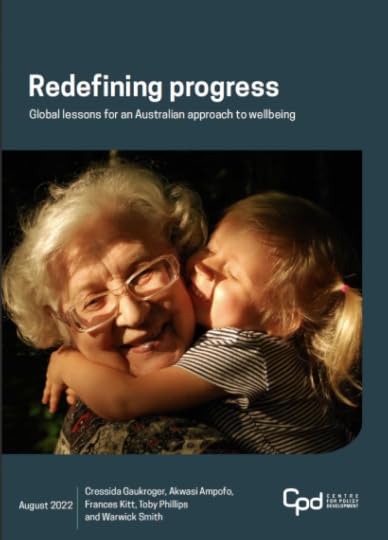
Redefining Progress is a report from the Centre For Policy Development’s Wellbeing Initiative. Looking at 21 global approaches to wellbeing over the past 50 years it identifies four key characteristics of advanced wellbeing approaches to guide an Australia’s wellbeing journey.
Measure what matters It is only with the right kinds of measurements that we can assess the outcomes of budget allocations and policy selection. Measurement must be a means rather than an end. It must be timely, able to be disaggregated, have a measure of consistency while being responsive to change in accordance with best practice, and tolerate both ambiguity and gaps in data availability.Guide decisions with data The purpose of wellbeing frameworks is to optimise wellbeing, not the practice of measuring wellbeing. It is on this point – the translation of measurement and principles to policy – that we see wellbeing approaches stumble. Practical decision-making guidance takes wellbeing beyond abstract rhetorical statements into day-to-day policy design, decision-making and implementation.Embed wellbeing across institutions Governments are changing how they do business to achieve their wellbeing goals. Governments have many tools at their disposal here: from creating central coordinating teams to working with citizens and communities to set priorities.Build accountability for progress Transparent assessment and reporting guards against corner-cutting and lip-service, and can be implemented with appropriate measures to enable frank advice from public servants and robust debate among elected officials. The strongest measures combine reporting with additional mechanisms such as independent oversight and structural changes in the way departments work together. Read 'Redefining Progress'Media Release Endorsements for Redefining Progress Australian Research Alliance for Children and Youth
Future generations can thrive if we chart a course to wellbeing in Australia. Embedding a sophisticated approach to wellbeing in the design, delivery and evaluation of services for children and young people at all levels of government is the right thing for Australia to do. The Nest – Australia’s wellbeing framework for children and young people provides a way of thinking about the whole child in the context of their lives. The consideration of wellbeing is not new, and we all benefit from the developing understandings of what contributes to a ‘good life’. Penny Dakin – CEO, ARACY
Rebecca Huntley
Australians want to see progress towards wellbeing. They judge government on how well it advances the things that matter most to them and their communities. Upgrading our government to pursue wellbeing will strengthen communities, boost faith in institutions and bring us closer to the society we want to become.
Rebecca Huntley, social researcher Australian Council of Social Services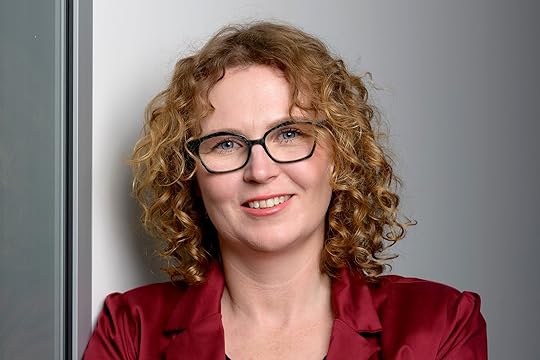
It’s time to put wellbeing at the heart of government, and this is critically important to reduce poverty and inequality in Australia. People whose needs are not met by legacy approaches to government will be the greatest beneficiaries of wellbeing government, and with more than half the OECD and several states and territories already making this journey, Australia should join them. Edwina MacDonald – Acting CEO, ACOSS
The post Redefining Progress: Global lessons for an Australian approach to wellbeing appeared first on Centre for Policy Development.
Redefining Progress – Centre for Policy Development – Wellbeing Initiative

Redefining Progress is a report from the Centre For Policy Development’s Wellbeing Initiative.
Looking at 21 global approaches to wellbeing over the past 50 years it identifies four key characteristics of advanced wellbeing approaches to guide an Australia’s wellbeing journey.
Measure what matters It is only with the right kinds of measurements that we can assess the outcomes of budget allocations and policy selection. Measurement must be a means rather than an end. It must be timely, able to be disaggregated, have a measure of consistency while being responsive to change in accordance with best practice, and tolerate both ambiguity and gaps in data availability.Guide decisions with data The purpose of wellbeing frameworks is to optimise wellbeing, not the practice of measuring wellbeing. It is on this point – the translation of measurement and principles to policy – that we see wellbeing approaches stumble. Practical decision-making guidance takes wellbeing beyond abstract rhetorical statements into day-to-day policy design, decision-making and implementation.Embed wellbeing across institutions Governments are changing how they do business to achieve their wellbeing goals. Governments have many tools at their disposal here: from creating central coordinating teams to working with citizens and communities to set priorities.Build accountability for progress Transparent assessment and reporting guards against corner-cutting and lip-service, and can be implemented with appropriate measures to enable frank advice from public servants and robust debate among elected officials. The strongest measures combine reporting with additional mechanisms such as independent oversight and structural changes in the way departments work together. Read 'Redefining Progress'Media Release Endorsements for Redefining Progress
Australian Research Alliance for Children and Youth

Future generations can thrive if we chart a course to wellbeing in Australia. Embedding a sophisticated approach to wellbeing in the design, delivery and evaluation of services for children and young people at all levels of government is the right thing for Australia to do. The Nest – Australia’s wellbeing framework for children and young people provides a way of thinking about the whole child in the context of their lives. The consideration of wellbeing is not new, and we all benefit from the developing understandings of what contributes to a ‘good life’.
Penny Dakin – CEO, ARACY
Rebecca Huntley
Australians want to see progress towards wellbeing. They judge government on how well it advances the things that matter most to them and their communities. Upgrading our government to pursue wellbeing will strengthen communities, boost faith in institutions and bring us closer to the society we want to become.
Rebecca Huntley, social researcherThe post Redefining Progress – Centre for Policy Development – Wellbeing Initiative appeared first on Centre for Policy Development.
August 8, 2022
Climate & Recovery Initiative Stakeholder Roundtable Nine
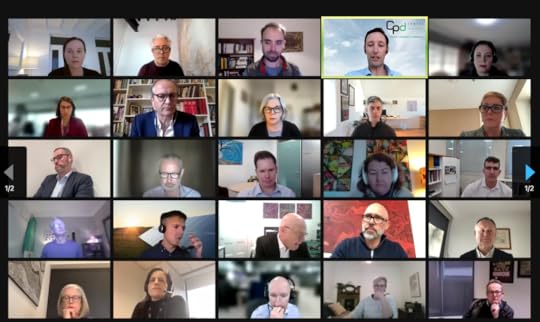
The ninth Climate and Recovery Initiative roundtable convened virtually on Monday 8 August 2022.
The key question for this roundtable was: “How do we keep momentum for decarbonisation in this new macroeconomic environment?” Themes brought out by a CPD discussion paper on the interactions between inflation, energy, economic policy and climate change were discussed by participants.
The roundtable heard directly from former UK Minister for Climate Change & Industry and Senior Advisor to Pollination, Nick Hurd, who shared his perspectives of how the United Kingdom and Europe is dealing with current energy price shocks and inflation concerns, and the implications for the clean energy transition.
Anthea Harris, Chief Executive Officer of the Energy Security Board, then presented to the group on the issues inherent in reforming Australia’s National Electricity Market as the system shifts to greater concentrations of renewables.
Participants shared views on how climate and energy policy could be a positive macroeconomic force leading to stronger growth and productivity. The group then broke into sub-groups to discuss different aspects of the potential policy response to current macroeconomic conditions and energy price shocks including demand-side response and economic policy settings.
In line with the custom of the Climate and Recovery Initiative, this discussion was held under the Chatham House Rule.
Key documents About the Climate and Recovery InitiativeThe Climate and Recovery Initiative (CRI) is a collaborative initiative coordinated by the Centre for Policy Development (CPD) and Climateworks Centre, with a steering group that includes Pollination Group, Australian Industry Group (AiGroup) and the Australian Council of Trade Unions (ACTU).
Working together, we are seeking to identify the best ideas and opportunities for aligning Australia’s economic recovery with climate and transition priorities, and to get them into the right hands. Our stakeholder roundtable series brings together trusted leaders, experts and advisers from business, regulation, policy and the community to consider the challenges and opportunities ahead.
The post Climate & Recovery Initiative Stakeholder Roundtable Nine appeared first on Centre for Policy Development.
August 2, 2022
Eleventh meeting | ASIA DIALOGUE ON FORCED MIGRATION | 2022

The Asia Dialogue on Forced Migration (ADFM) convened virtually for its eleventh meeting in 2022, with part part one taking place on 24 March and the second part taking place on 1 July.
We were delighted to have opening remarks from the distinguished Foreign Minister of Indonesia, Retno Marsudi, and the Foreign Minister of Malaysia, Saifuddin Abdullah in part one of the meeting.
Other attendees and presenters included senior government officials from eight countries, international organisations and civil society representatives.
Key documents for part one:
Full agenda and participant listParticipant profilesMeeting summaryKey documents for part two:
Full agenda, participant list and discussion paperParticipant profilesADFM Co-Convenors’ StatementThe March meeting focused on opportunities for reform of the Bali Process on People Smuggling, Trafficking in Persons and Related Transnational Crime on its twentieth anniversary this year.
This culminated in the Future Ready report, setting out an eight-step plan to strengthen and clarify the Bali Process so countries in the Indo-Pacific can manage forced migration crises in a way that is durable, effective and humane.
The ADFM has worked closely with the Bali Process since its inception in 2015 to strengthen the multilateral body’s ability to address forced migration in the Indo Pacific. This includes considerable work in 2016 following the Andaman Sea crisis.
The July meeting focused on ongoing humanitarian and displacement crises in Afghanistan and Myanmar, and discussed how the region can prepare and respond more effectively. COVID-19 and the invasion of Ukraine underscore the importance of not only responding to crises as they occur but being prepared for future events.
The co-convenors’ statement from this meeting highlights points of agreement and a number of opportunities ahead which states can use to develop more humane responses to forced migration challenges.
The next ADFM meeting will be convened in person over two days, likely in the first quarter of 2023. We welcome suggestions for areas of focus.
The post Eleventh meeting | ASIA DIALOGUE ON FORCED MIGRATION | 2022 appeared first on Centre for Policy Development.
July 30, 2022
Starting Now – Centre for Policy Development

Starting Now is a briefing paper from the Centre for Policy Development that sets out a roadmap to a universal, accessible and affordable early childhood system that families can rely on.
Following 2021’s Starting Better report which provided a long-term vision for the best early childhood system for Australia, Starting Now gives leaders a roadmap with concrete achievable steps over the next 12 months.
The paper recommends swift and coordinated action in three key areas:
Action to give parents the confidence to balance work and home by ensuring education and care is available and affordable. This includes: Accelerated changes to subsidy arrangements, measures that ensure public spending flows through to families, educators and teachers, and smarter spending coordination between governments.Action on rewarding, secure early childhood careers so children and families can work with early childhood professionals they know and trust. This includes appropriate valuation of early educators’ work, making early childhood careers a priority at the national Jobs and Skills summit, a tripartite dialogue between unions, employers and government, training incentives for early childhood careers, and lifelong learning for early childhood professionalsA national mission for a universal early childhood system This includes a formal agreement between First Ministers to work together on a universal early childhood system, a reform task force to implement it, a special commissioner to lead a Productivity Commission review into a universal early childhood education and care, and long-term funding agreements. Download 'Starting Now'Media Release Endorsements for Starting Now
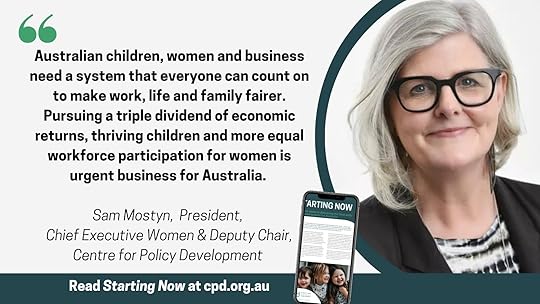
 Starting Now at a Glance
Starting Now at a Glance
 Starting Now in the Media
Starting Now in the Media

Centre for Policy Development’s early childhood development council co-chair Leslie Loble says early childhood education and care is on the agenda for politicians around the country, and that should be used as a launch pad for other policies to help children
Sydney Morning Herald & Melbourne Age – ‘Massive brake’: Sector says workforce shortages a barrier to progress on childcare Katina Curtis, July 31, 2022
The post Starting Now – Centre for Policy Development appeared first on Centre for Policy Development.
July 25, 2022
CPD G20 Seminar Series: Unlocking Innovative Financing Schemes and Islamic Finance to a Just Energy Transition
In a G20 Seminar cohosted by the Centre for Policy Development, Climateworks and NGO partners across the region, expert panelists look at how we finance, manage and collaborate on energy transition across our region and the world.
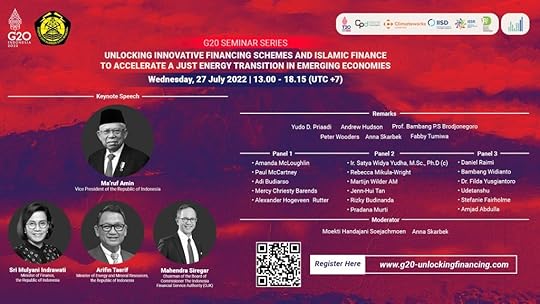
Key note speakers were Indonesian Vice President Ma’ruf Amin, Finance Minister Sri Mulyani Indrawati, Energy and Mineral Resources Minister Arifin Tasrif and Mahendra Siregar, Chairman of the Board of Commissioners, Financial Service Authority (OJK).
In his opening remarks, CPD CEO Andrew Hudson emphasised the need for cooperation to address the challenges that Australia and Indonesia share in the two nations’ decarbonisation pathway, as the world’s two largest coal exporters.
“If Australia and Indonesia can decarbonise, any nation can”, he said.
Watch the event READ CENTRE FOR POLICY DEVELOPMENT CEO ANDREW HUDSON'S OPENING REMARKSANDREW HUDSON, CEO, CENTRE FOR POLICY DEVELOPMENT
OPENING REMARKS TO THE G20 UNLOCKING INNOVATIVE FINANCING SCHEMES AND ISLAMIC FINANCE TO ACCELERATE A JUST ENERGY TRANSITION IN EMERGING ECONOMIES SEMINAR SERIES
CHECK AGAINST DELIVERY
SELAMAT SIANG
ON BEHALF OF THE ORGANISERS, WE ARE HONOURED BY THE PARTICIPATION OF HIS EXCELLENCY VICE PRESIDENT MA’RUF AMIN, HER EXCELLENCY MINISTER OF FINANCE SRI MULYANI INDRAWATI, HIS EXCELLENCY MINISTER OF ENERGY AND MINERAL RESOURCES ARIFIN TASRIF, HIS EXCELLENCY CHAIRMAN OF THE BOARD OF THE FINANCIAL SERVICE AUTHORITY MAHENDRA SIREGAR, PROFESSOR BAMBANG BRODJONEGORO, PAK YUDO PRIAADI. I WELCOME ALL SPEAKERS AND PARTICIPANTS, ONLINE AND IN THE ROOM.
THIS OFFICIAL G20 EVENT IS A REMINDER THAT CLOSE, INTELLIGENT COOPERATION IS THE KEY TO ACCELERATING THE ENERGY TRANSITION ACROSS ALL ECONOMIES WHILE MEETING DEVELOPMENT GOALS AND ENSURING THE PROSPERITY OF ALL NATIONS.
THE OPPORTUNITY THIS GATHERING REPRESENTS IS ENORMOUS; THE PRIZE ON OFFER IS INVALUABLE AND THE CONSEQUENCES OF FAILURE TOO GRAVE TO CONTEMPLATE.
ENERGY TRANSITIONS CAN CREATE ENORMOUS ECONOMIC, ENVIRONMENTAL AND SOCIAL BENEFITS ACROSS ALL ECONOMIES.
PRIVATE AND PUBLIC SECTOR INVESTMENTS MUST BE STRATEGICALLY ALIGNED SO EACH AMPLIFIES THE OTHER.
POLICY SETTINGS, BOTH WITHIN AND BETWEEN NATIONS, MUST DELIVER CLEAR SIGNALS THAT PROVIDE CONFIDENCE AND STABILITY TO INVESTORS AND BUSINESS.
ABOVE ALL, WE MUST BE WILLING TO EMBRACE CHANGE IN A WAY THAT PROTECTS THE WELLBEING OF THOSE MOST AFFECTED BY TRANSITION.
OUR EVENT TODAY WILL EXPLORE HOW TO FINANCE RENEWABLE GENERATION AND THE INFRASTRUCTURE THAT SUPPORTS IT IN EMERGING ECONOMIES. IT WILL EXAMINE HOW ECONOMIES LIKE INDONESIA CAN FINANCE TRANSITION AND HOW DEVELOPED NATIONS CAN ENCOURAGE THE FLOW OF PRIVATE CAPITAL.
SPEAKING AS AN AUSTRALIAN, I KNOW THERE ARE MANY CHALLENGES AND OPPORTUNITIES THAT WE SHARE WITH INDONESIA IN PURSUING THE CLEAN ENERGY TRANSITION. BETTER, STRONGER, AND MORE INNOVATIVE REGIONAL COOPERATION IS URGENTLY NEEDED AS EACH ENERGY TRANSITION IS UNIQUE.
AUSTRALIA AND INDONESIA ARE THE WORLD’S TWO LARGEST COAL EXPORTERS. AS OUR EXPORT MARKETS INEVITABLY SHIFT TO CLEAN ALTERNATIVES, BE IT SOLAR, WIND OR OTHER RENEWABLES, BOTH NATIONS WILL NEED TO SEIZE THE OPPORTUNITIES OF THE NET ZERO ECONOMY AND PRODUCE THE ENERGY, MINERALS AND OTHER GREEN PRODUCTS OUR CUSTOMERS WILL DEMAND.
IF AUSTRALIA AND INDONESIA CAN DECARBONISE, ANY NATION CAN.
AUSTRALIA AND INDONESIA BOTH FACE SOCIAL, FINANCIAL AND POLITICAL CHALLENGES IN THIS TRANSITION.
SIGNIFICANT COMMUNITIES AND INDUSTRIES HAVE COALESCED AROUND LEGACY ENERGY, AND WE MUST MAKE SURE THEY LEAD THE PACK FOR OPPORTUNITIES, PROJECTS AND INVESTMENTS IN CLEAN INDUSTRIES.
THERE ARE SIGNIFICANT TRADE OPPORTUNITIES BETWEEN THE TWO NATIONS ACROSS GREEN AND SUSTAINABLE INDUSTRIES, FOR EXAMPLE THE SUN CABLE PROPOSAL.
AUSTRALIA WILL NEED MANY OF THE RESOURCES AND MANUFACTURING INDONESIA HAS TO HELP ACCELERATE OUR TRANSITION.
IN MANY WAYS, WE EACH HOLD THE KEY TO THE OTHER’S SUCCESS.
THE CLOSER TIES BETWEEN OUR NATIONS REPRESENTED BY OUR TRADE LINKS, OUR DIPLOMATIC EFFORTS AND OUR INDUSTRIAL TRANSFORMATIONS, CAN SEE US BE MORE COLLABORATIVE PARTNERS IN DRIVING DECARBONISATION ACROSS OUR REGION.
THE RECENTLY ANNOUNCED AUSTRALIAN/INDONESIAN $200 MILLION CLIMATE AND INFRASTRUCTURE PARTNERSHIP IS A STEP IN THIS DIRECTION.
A CLEAR ASSESSMENT OF OUR SHARED TRANSITION SHOWS THAT GOVERNMENTS CANNOT DO IT ALONE. PRIVATE FINANCE WILL BE NEEDED TO DRIVE THE TRANSITION.
ULTIMATELY THE LAST FIVE YEARS HAS SEEN A MARKED SHIFT AMONG INSTITUTIONAL INVESTORS, WHO INCREASINGLY RECOGNISE THE FINANCIAL RISKS ASSOCIATED WITH CLIMATE CHANGE AND ARE TILTING THEIR INVESTMENTS GREEN.
SIMILARLY SOVEREIGN EXPORT FINANCE AGENCIES ARE INCREASINGLY WITHDRAWING FROM COAL PROJECTS DUE TO OUR COMMON CLIMATE COMMITMENTS.
COUNTRIES WHO WANT TO BE IN THE RACE FOR GLOBAL CAPITAL WILL NEED CREATE NEW INVESTMENT OPPORTUNITIES CONSISTENT WITH MEETING OUR PARIS AGREEMENT GOALS.
IN THE LEAD-UP TO THE G20 LEADERS’ SUMMIT, AND FOLLOWING ON FROM THE RECENT SYDNEY ENERGY FORUM, WE HAVE A POWERFUL OPPORTUNITY TO CALL FOR SUCH ACTION.
OUR FIRST PANEL WILL DISCUSS HOW INNOVATIVE PUBLIC FINANCING CAN HELP WITH ENERGY TRANSITION AND FACILITATE THE FLOW OF GREATER CAPITAL.
OUR SECOND PANEL WILL DISCUSS HOW PRIVATE FINANCE CAN HELP ACHIEVE NET ZERO EMISSIONS AND LOOK AT THE CONDITIONS INSTITUTIONAL INVESTORS NEED TO DEPLOY CAPITAL.
AND OUR LAST PANEL EXPLORES HOW WE CAN HELP LOCAL ECONOMIES MOST AFFECTED BY ENERGY TRANSITION TO SEIZE NEW OPPORTUNITIES AND FLOURISH.
FROM FINANCE AND INVESTMENT CONDITIONS TO THE CALCULATION OF SOCIAL COSTS, THE CATALYSTS FOR TRANSFORMATIVE CHANGE ARE PARTICIPATING TODAY.
CPD, IN COLLABORATION WITH CLIMATEWORKS AND OTHER PARTNERS, COMMITS TO ENSURING THIS EVENT IS NOT JUST A ONE-OFF – BUT RATHER IS THE START OF ONGOING DIALOGUE ESPECIALLY BETWEEN AUSTRALIA AND INDONESIA, THAT EXTENDS BEYOND THIS YEAR’S INDONESIAN PRESIDENCY OF THE G20, INTO AND BEYOND NEXT YEAR’S INDONESIAN CHAIRING OF ASEAN, TO HELP SUPPORT AN EFFECTIVE ENERGY TRANSITION IN OUR REGION.
THANK YOU
ENDS
The post CPD G20 Seminar Series: Unlocking Innovative Financing Schemes and Islamic Finance to a Just Energy Transition appeared first on Centre for Policy Development.
Unlocking Innovative Financing Schemes and Islamic Finance to a Just Energy Transition
In an G20 Seminar Series event cohosted by the Centre for Policy Development and Climateworks, expert panelists look at how we finance, manage and collaborate on energy transition across our region and the world.
Key note speakers are Indonesian Vice President Ma’ruf Amin, Finance Minister Sri Mulyani Indrawati, Energy and Mineral Resources Minister Arifin Tasrif and Mahendra Siregar, Chairman of the Board of Commissioners, Financial Service Authority (OJK).
Register for online attendance.
A YouTube livestream of the event will be available here from 16.00 AEST / 13.00 WIB on Wednesday.
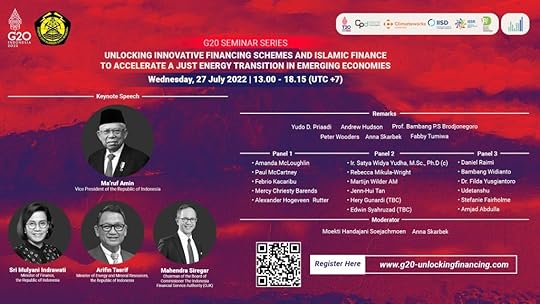
The post Unlocking Innovative Financing Schemes and Islamic Finance to a Just Energy Transition appeared first on Centre for Policy Development.
Centre for Policy Development's Blog
- Centre for Policy Development's profile
- 1 follower


